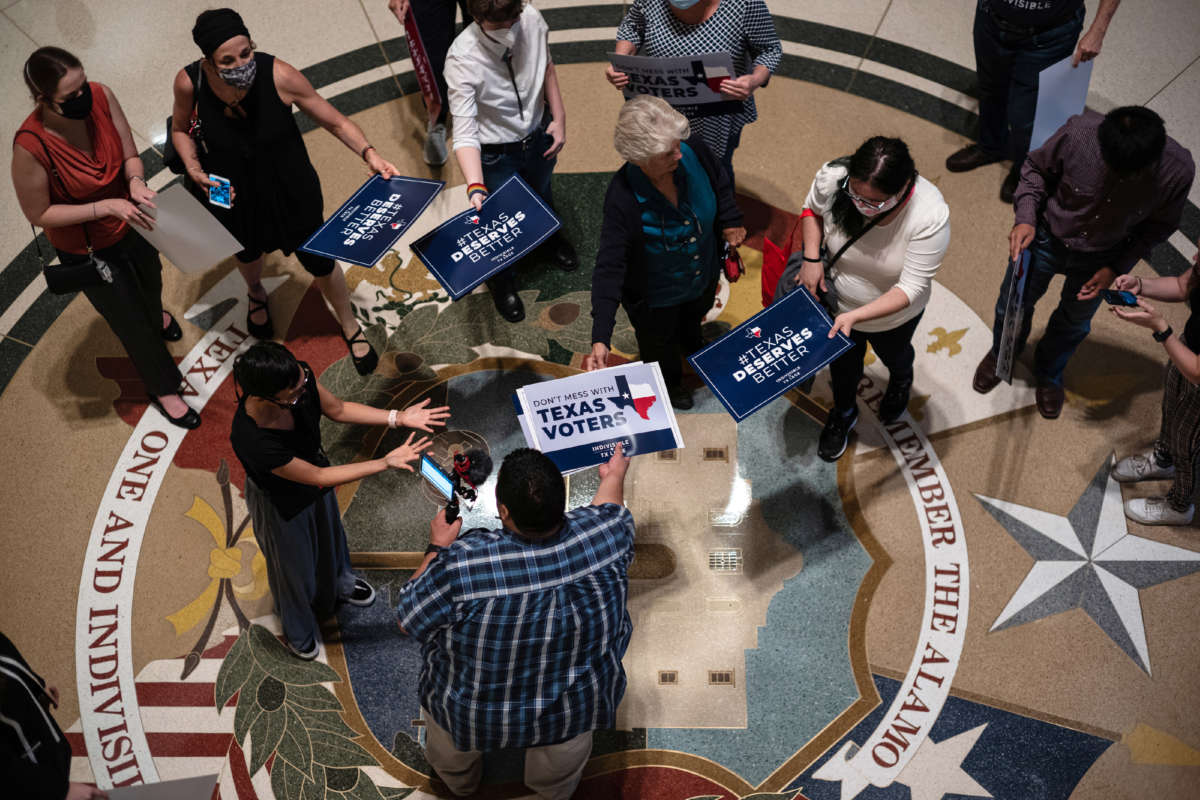Just days after the Texas state legislature convened for a special session, GOP legislators in the state are trying once again to ram through a new voter suppression bill into law. The lawmakers had failed to pass a previous version of the bill after Democrats walked off the floor at the end of the legislative session in May to deny quorum and block the legislation.
It appears that Democrats are prepared to try that strategy again. At least 58 Democratic members of the Texas House are evidently planning to flee the state on Monday, this time for weeks, to block the GOP’s new voter suppression bill as well as a slate of other Republican priorities that are planned for the session.
In fleeing the state, the legislators are risking legal consequences, according to NBC. The Texas legislature requires lawmakers to be in the chamber to reach quorum.
But the legislation that the Democrats are planning to block could result in dire consequences for voting access in the state. The slate of proposals in the most recent version of the Republican bill makes the package one of the worst, most restrictive voter-suppression bills in the country, voting advocates say. Texas is already one of the hardest states to vote in.
The new bill retains many of the proposals from the first version, such as banning drive-through and 24-hour voting, barring election officials from sending out unsolicited absentee ballot applications, empowering partisan poll watchers and adding restrictions to voting by mail, among other things.
Republican legislators rammed the bill through committee in the House after about 24 straight hours of testimony and debate, passing it along party lines early Sunday morning. The Senate advanced the bill through committee on Sunday afternoon, meaning the bill could come to a floor vote this week.
Hearings on the bill attracted hundreds of members of the public, including former member of Congress Beto O’Rourke, to testify at the hearing on the restrictive legislation. Many of the Texans who signed up to testify were against the legislation, but they had to wait nearly 18 hours to do so as legislators debated the package.
Democrats may also be hoping to block other alarming proposals that Republicans are planning to raise during this legislative session.
Gov. Greg Abbott, a Republican, called the special legislative session not only to pass the voter suppression legislation but also to advance a slate of other Republican wish-list items that are currently sweeping the country, such as a ban on teaching Black American history in schools, placing further restrictions on abortions and taking steps to end what Republicans view as “censorship” on social media platforms.
The new version of the voter suppression bill, however, doesn’t contain a couple of key items from the last draft: allowing judges to overturn election results and wide restrictions on Sunday early voting, when many Black voters turn out to vote after attending church.
Getting rid of those two troubling items doesn’t necessarily signal good intentions on the part of the Republicans. The proposal to allow the overturning of election results was a last-minute and extremely controversial addition to the earlier version of the bill in the spring. The proposal to end Sunday early voting was a subject of controversy not only for its likely racist intention of suppressing Black voters, but also because the Texas GOP claimed, somewhat dubiously, that the sweeping restriction that would affect millions of voters was a mere typo.
The Republicans’ voter-suppression effort in Texas is one of hundreds of similar efforts by conservative lawmakers across the country to restrict voting. As of May, 489 restrictive bills had been filed in 48 states, many of which have advanced in the legislature and some of which have passed into law.
Texas Attorney General Ken Paxton appears to be trying to help his fellow Republicans in their efforts to throw completely unfounded questions into the election process. Just before the GOP unveiled the latest voter-suppression bill in the state, Paxton tweeted about the arrest of Hervis Rogers — which he had ordered — on two counts of illegal voting.
Rogers, who went semi-viral in a CNN clip last year for waiting over six hours in line to vote in the 2020 presidential primaries, was on parole when he voted once in 2018 and once in March of 2020. Under Texas law, it is illegal for someone in prison or on parole to cast a ballot.
However, in order to be found guilty of illegal voting, the person in question must have “knowingly” voted illegally. Rogers’s lawyers argue that he wouldn’t have talked to national TV news reporters if he had known it was illegal. “He’s really devastated,” one of Rogers’s lawyers told The Washington Post. “He does not want to go back to jail.”
Still, Paxton boasted about the arrest, saying that he is standing up against voter fraud. But considering there was no evidence of widespread voter fraud in the 2020 election, it’s more than likely that he is simply trying to build the case for more voter suppression.
Join us in defending the truth before it’s too late
The future of independent journalism is uncertain, and the consequences of losing it are too grave to ignore. To ensure Truthout remains safe, strong, and free, we need to raise $43,000 in the next 6 days. Every dollar raised goes directly toward the costs of producing news you can trust.
Please give what you can — because by supporting us with a tax-deductible donation, you’re not just preserving a source of news, you’re helping to safeguard what’s left of our democracy.
